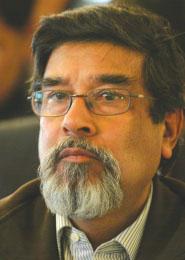 By Tirthankar Mukherjee
By Tirthankar MukherjeeConsidering the alacrity with which media persons in Mongolia track the Internet, I was surprised to find in the Home page of The World Justice Project that even after a week of the release of its latest Rule of Law Index -- the third in an annual series -- there was no record of any feedback from Mongolia. This was earlier this month and maybe the media in Ulaanbaatar have taken notice of the Index since then – particularly because Mongolia has scored much higher than generally expected -- but I am still writing this as I found the Index both important and interesting and think it deserves wider dissemination.
The World Justice Project is apparently an independent, non-profit organisation and sees its role as helping advance the rule of law around the world, as a fundamental component in achieving communities of opportunity and equity -- communities that offer sustainable economic development, accountable government, and respect for fundamental rights. Without the rule of law, “medicines do not reach health facilities due to corruption; women in rural areas remain unaware of their rights; people are killed in criminal violence; and firms see their costs rise because of extortion and uncertainty about expropriation,” says the Project, and very right it is, too.
The WJP calls its Index “an innovative quantitative assessment tool” designed to offer a detailed and comprehensive picture of the extent to which countries adhere to the rule of law in practice. The data provided apply to nine dimensions of the rule of law: limited government powers; absence of corruption; order and security; fundamental rights; open government; regulatory enforcement; civil justice; criminal justice; and informal justice.
This latest Index has been built on five years of development, intensive consultation, and vetting with academics, practitioners, and community leaders from over 100 countries, and 17 professional disciplines. It gives the data results and Index scores for 97 countries, along with key findings and an explanation of the methodology used. The scores and rankings are constructed from over 400 variables drawn from two original sources of data collected from independent sources in each country: a General Population Poll, and a series of Qualified Respondents’ Questionnaires. Worldwide, over 97,000 people and 2,500 experts have participated in the exercise. Every country provided 1,000 respondents, a rather tall figure for Mongolia, it would seem.
Rather than looking at laws, actors, or institutional arrangements, the Index assesses a nation’s level of adherence to the rule of law by examining practical situations in which a deficit of this adherence could affect the daily lives of ordinary people. For instance, it evaluates whether citizens can access public services without the need to bribe a government functionary; whether a basic dispute among neighbours or companies can be resolved peacefully and cost-effectively by an unbiased and reliable adjudicator; and whether people can conduct their daily activities without fear of crime or police or authoritarian abuse. These are among the common situations that occur in the lives of people and that are directly influenced by the degree of rule of law in any society.
This rule of law refers to a system in which the following four universal principles are upheld:I. A government, its officials and agents are accountable under the law.
II. Laws are clear, publicized, stable, and fair, and protect fundamental rights, including the security of persons and property.
III. The process by which the laws are enacted, administered, and enforced is accessible, fair, and efficient.
IV. Justice is delivered by competent, ethical, and independent representatives and neutrals who are of sufficient number, have adequate resources, and reflect the makeup of the communities they serve.
The report is heavy reading, and not just because of the unavoidable use of the platitudes of idealism or the clichйs of good intention. In trying to be detailed, it becomes repetitive and sometimes, methinks, it protests too much. Still, it is a most important document. The 97 indexed countries have been put in seven regions: Western Europe and North America; Latin America and the Caribbean; East Asia and Pacific (that is where we are); South Asia; Eastern Europe and Central Asia; Middle East and North Africa; and Sub-Saharan Africa.
Mongolia ranks fifth among lower-middle income countries on order and security and second on protection of fundamental rights. The country also scores relatively well on civil and criminal justice. The press and civil society organizations have been found to generally operate without government interference. The country’s weakest performance is in the area of open government, ranking ninety-third overall and next to last among its income peers. This deficiency is explained by severe limitations on citizens’ right to petition the government and access to official information. Other areas of concern are corruption, particularly in the legislature, and unchecked influence of powerful private interests on all branches of government.
The following graphical representation, taken from the Index, says it all. The respondents in Mongolia appear to have been restricted to Ulaanbaatar, Erdenet and Darkhan. The country is in the lower middle income group. Its population is shown as 3 million, 63% of them urban, with the three cities accounting for 43% of the total.

The findings should be interpreted in the light of certain inherent limitations. No Index is any more than a general assessment of the situation in a given country at a particular moment in time. No matter what one thinks of the fairness of the conclusions and the appropriateness of the rankings (these depend also on the score of the other countries), policy-makers, civil society, practitioners,and other constituencies would do well to study the report and scan the data. No society has ever attained -- let alone sustained -- a perfect realisation of therule of law. Mongolia is not alone in facing the perpetual challenge of building and renewing structures, institutions,and norms.
 By Tirthankar Mukherjee
By Tirthankar Mukherjee